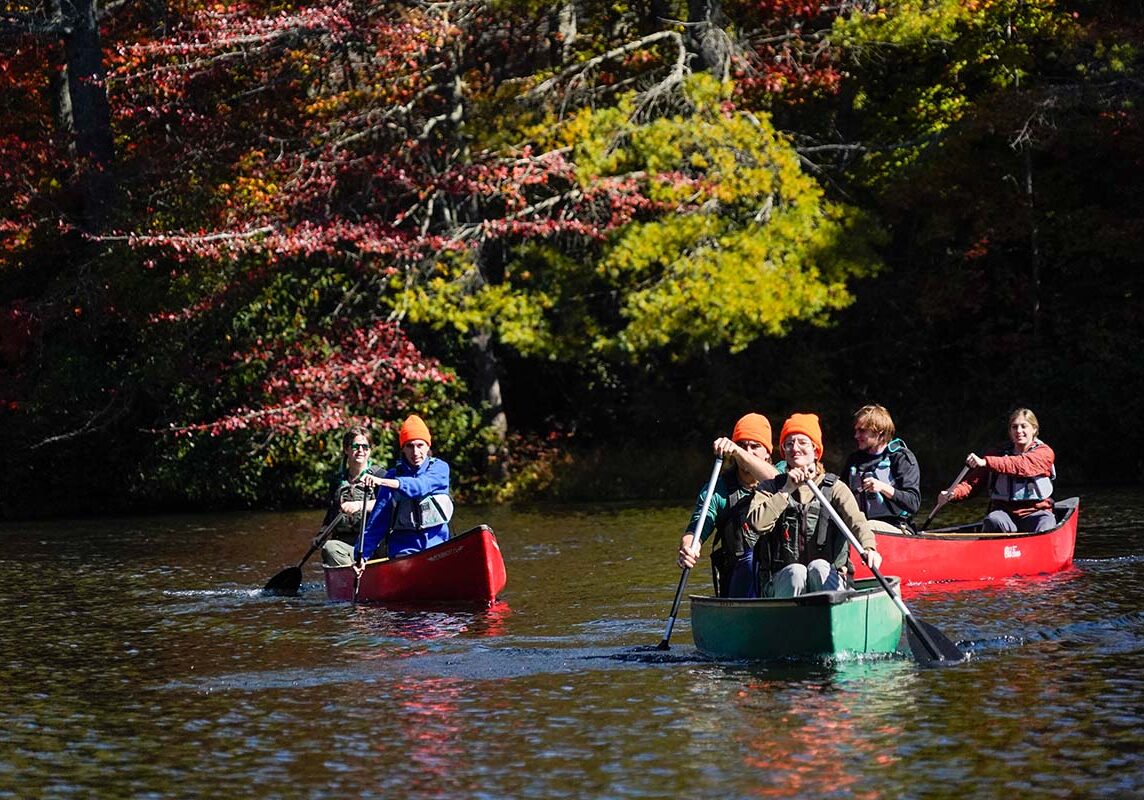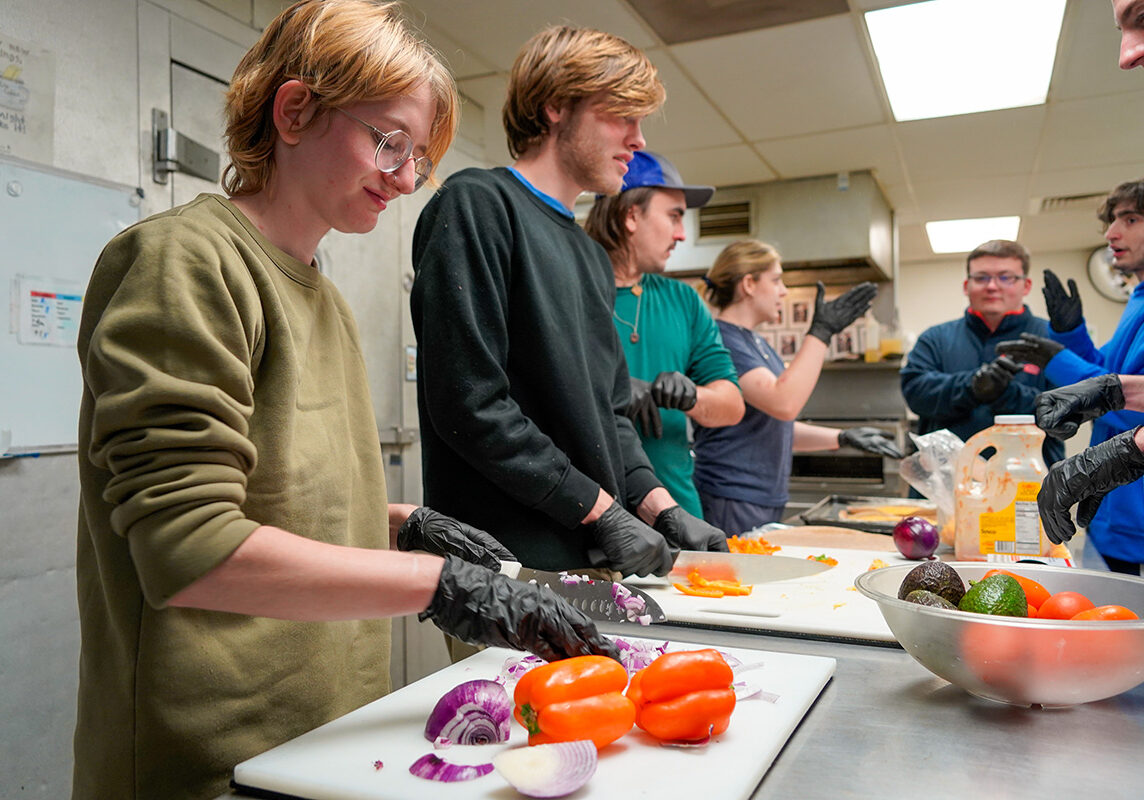Social-Emotional Learning & College Readiness
Experiential Education at Momentum
Education at Momentum propels students toward positive outcomes in and out of the classroom. In a dynamic, inclusive, and experiential learning environment, we offer three core classes designed to meet the diverse needs of our students.
Through hands-on education, our students have the opportunity to earn college credit, become certified in Wilderness First Aid and ServSafe Food Handling, learn to manage stress and mental health, develop the social and emotional learning skills needed to maintain positive relationships, and hone self-management skills in preparation for college-level academic achievement.
The following three classes are woven into the daily life of each Momentum Student and are integral to Momentum's experiential education curriculum and college readiness program.
Social-Emotional Learning
Outdoor Recreation Course
Healthy Living & Nutrition
Outdoor Recreation Course
Earn a Wilderness First Aid Certification.
Outdoor Rec is an incredible Challenge by Choice opportunity for students to find empowerment in the outdoor world and build skills they can continue practicing as they transition into their next steps.
Outdoor Skills, Risk Management, & First Aid
The Outdoor Rec course offers students a chance to get basic instruction and hands-on practice with the fundamental outdoor exploration skill areas:
- Basic Wilderness First Aid Certification Training
- Environmental Awareness & Leave No Trace
- Trip Planning
- Risk Management
- Outdoor Living
Students learn skills related to choosing and caring for gear, setting up camp, basic navigation skills like reading a map and using a compass, and planning overnight camping trips.

In addition to these fundamentals, Outdoor Rec introduces students to rock climbing, mountain biking, backpacking, and canoeing (in the warm months).
With no prior experience needed, our Adventure Facilitator and Field Instructors offer weekly opportunities for students to find an appropriate level of engagement in our activities through our Challenge by Choice approach and work towards competence in each activity.
Healthy Living & Culinary Basics Course
Earn a ServSafe Food Handler Certification.
Develop essential work and life skills in the kitchen with our Healthy Living & Culinary Basics course.
Nutrition, Food Prep, & Kitchen Safety
Healthy Living and Culinary Basics is a kitchen-based life skills course that invites students to become familiar with preparing delicious, whole foods for themselves and their peers while learning how to operate within a commercial kitchen.
The Healthy Living portion of the class introduces students to an anti-inflammatory diet and the concept of international Blue Zones and gives each student a working menu of delicious meals that they cook throughout their stay.
When students arrive with dietary preferences or restrictions, they have the opportunity to collaborate with the kitchen manager to find suitable alternatives or replacements to meet their needs.

The Culinary Basics portion of this course offers food preparation and kitchen safety instruction. Topics include knife practice, fire safety, cooking techniques, flavor profiles, and the opportunity to earn a ServSafe Food Handler Certification.
Momentum's Unique Educational Approach
Momentum fosters a safe and positive classroom environment where all students, regardless of their academic background, learning difficulties, or developmental differences, can engage meaningfully with our classes. Our small, hands-on learning environment is designed to be accessible to everyone.
Leveraging 529 Funds
529 Funds Can Cover the Cost of Our Entire Program
Every student that registers for college credit and completes the program is eligible to pay for the entire program using 529 funds.
Students who register for college credit and complete Momentum's program are eligible to use 529 funds to cover the costs. As an Outdoor and Experiential Education Program Partner with WCU’s Center for Learning and Innovation, the SEL course and program at Momentum qualify as a 529 expense.
Students fill out a WCU registration form during enrollment to opt for SEL class credits. The program, including the SEL class, is designed to be completed in 10-12 weeks.
The 529 account owner can make a qualified distribution equal to the program cost. Any additional costs beyond the standard 10-12 week period must be settled privately.
Learning Accommodations
Our educators are integral to each student's treatment team, working collaboratively to tailor content to individual needs.
Accommodations will always be considered to meet individual needs and may include:
- extra time,
- one-on-one support with writing assignments,
- large-font handouts,
- or other modifications.
Students can address specific needs privately with the educator and clinical team.
High School Completion & Credit
For students needing high school completion, we refer them to Fusion Global Academy (FGA), which offers "personalized instruction in a virtual setting for middle and high school students worldwide."
Students can connect with FGA and collaborate with their instructors to work towards high school completion while at Momentum. A student may expect to work towards completion of one outstanding high school course while at Momentum and may continue to work on any other outstanding classes after their time with Momentum has concluded.
Earn College Credit
Our SEL program is accredited by Western Colorado University (WCU), which also accredits the National Outdoor Leadership School (NOLS), Outward Bound, and other nationally recognized outdoor recreation programs.
All students take the SEL course, but earning 3 college credits is optional. To do so, students must complete a WCU registration form and pay $540 for the credits (529 Funds can cover this cost). This elective course has been accepted by every university attended by Momentum's graduates.

Social-Emotional Learning Course (SEL)
Earn college credits from Western Colorado University (3 credit hours).
“Social-Emotional Learning (SEL) is the process through which all young people and adults acquire and apply the knowledge, skills, and attitudes to develop healthy identities, manage emotions and achieve personal and collective goals, feel and show empathy for others, establish and maintain supportive relationships, and make responsible and caring decisions."
~The Collaborative for Academic, Social, and Emotional Learning (CASEL)
5 Pillars of Social and Emotional Learning
Our Social-Emotional Learning curriculum is designed to introduce key skills and ideas to our students during their stay at Momentum. Like other SEL programs, ours is structured around five basic tenets that reflect our therapeutic approach:
These pillars include basic personal and interpersonal skills that are developed throughout a 12-unit curriculum that covers topics related to personal identity, group dynamics, leadership, verbal and non-verbal communication, decision-making, emotional regulation, self-efficacy, relationship building, managing conflict, personal values and goal setting, and empowering others in a culture of inclusivity and empathy.
Benefits of Introducing These Concepts in a Holistic Therapy Environment:
Putting Theory Into Practice
Each week, students cover a topic in the classroom and then engage in a Challenge by Choice weekend where students have the opportunity to put theory into practice and demonstrate their newly developed social and emotional skills.
During the following week, students return to the classroom to debrief their experiences and continue to integrate what they’ve learned, eventually leaving the SEL classroom with a greater understanding of building healthy relationships and finding meaning through connection.
Example: Students spend one week in the classroom learning strategies for conflict resolution. Then, during a hike on a Challenge by Choice weekend, some students disagree about the hike's pace and their goals for the day. Our Field Staff support the students as they attempt to move through the conflict using the social-emotional skills and strategies they learned earlier in the week. Regardless of the outcome, the students are back in class the following week to debrief the incident and learn from what went well and what could have gone better.
Accommodating Diverse Learning Styles
The instructional material offers opportunities for students of diverse learning styles to engage with the concepts experientially.
Each lesson features kinesthetic, visual, written, verbal, and reading components and allows the students to demonstrate comprehension through visual, verbal, and written formats.
While there are some structured assignments, students have the freedom to find a means of expression that feels appropriate to them.
This flexibility allows students to connect to the social and emotional learning initiatives and material in whatever feels best.
Example: Instead of writing a reflection piece, students may express their learning creatively by making a poster or writing a poem. Or, they may choose to flex their verbal communication skills by sharing a brief presentation with the class.
College Accreditation & Credits
In addition to all of the intended clinical and interpersonal benefits mentioned above, this class is accredited by Western Colorado University. Students who complete the program and register with WCU are eligible for three college credit hours.